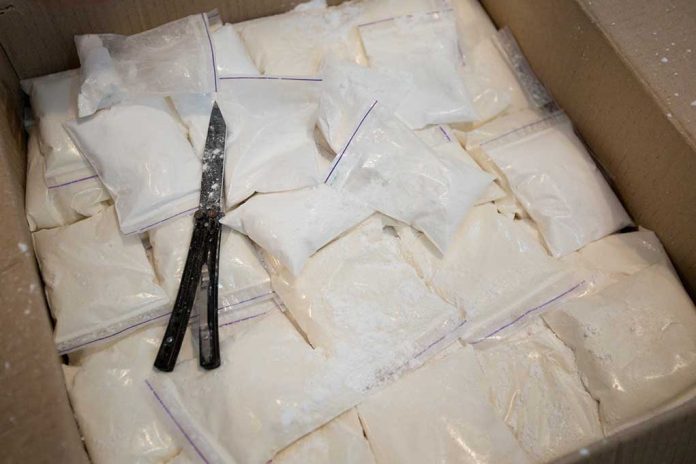
President Trump’s administration designates Mexican drug cartels as terrorist organizations, leveraging unprecedented financial sanctions to cut off their money supply and strangle their operations worldwide.
Key Takeaways
- Trump’s Treasury Department has sanctioned five leaders of the Cartel de Jalisco Nueva Generacion (CJNG), including its notorious kingpin “El Mencho,” effectively freezing their U.S. assets and criminalizing transactions with them.
- The administration’s dual-pronged strategy combines aggressive law enforcement actions with strategic media engagement to rally public support against cartel activities.
- Companies operating in regions with cartel presence now face increased scrutiny and potential criminal prosecution if found transacting with designated terrorist organizations.
- CJNG controls major fentanyl and methamphetamine production facilities in Mexico and uses the port of Manzanillo as a hub for international trafficking operations that reach as far as Australia and China.
- The U.S. is offering a $15 million reward for information leading to the arrest of cartel leader Ruben Oseguera Cervantes, demonstrating the administration’s commitment to dismantling these criminal enterprises.
Trump Administration’s Unprecedented Financial Warfare Against Drug Cartels
President Trump’s administration has launched a comprehensive assault on Mexican drug cartels by designating key organizations as terrorists and implementing crippling financial sanctions. The U.S. Department of the Treasury recently targeted five leaders of the Cartel de Jalisco Nueva Generacion (CJNG), one of Mexico’s most powerful and violent criminal organizations. These sanctions, authorized under Executive Orders 14059 and 13224, specifically target foreign organizations involved in the global illicit drug trade and terrorism. The move represents a significant escalation in the administration’s battle against cartels that traffic deadly fentanyl into American communities.
At the center of these sanctions is Ruben Oseguera Cervantes, known as “El Mencho,” the notorious leader of CJNG who now has a $15 million bounty on his head. Additional sanctions target four other high-ranking cartel members who oversee various aspects of the organization’s criminal empire. This designation means all property and interests of these individuals within U.S. jurisdiction are blocked, and Americans are prohibited from engaging in transactions with them. Companies found violating these prohibitions face severe civil penalties or criminal prosecution, creating a powerful deterrent against working with cartel-affiliated entities.
Deported 40 Times – Trump Still Cleaning Up Biden’s Mess, Jasmine Crocket, Chucky Schummer, the entire DNC and Soros.
Here’s a number that should make every American furious: 40.That’s how many times Julian Estrada-Garcia, a 36-year-old illegal alien from Mexico, has been… pic.twitter.com/08D6ITIImM
— Stan Speer (@StanSpeer1) April 5, 2025
Corporate America On Notice: New Legal Risks Under Trump’s Anti-Cartel Strategy
President Trump’s designation of cartels as terrorist organizations creates new legal hazards for American and multinational companies operating in regions with cartel activity. A recent federal indictment charging two Utah men with supporting Mexican cartels through a Texas-based crude oil company demonstrates the administration’s willingness to prosecute businesses that intersect with these criminal organizations. This case serves as a stark warning to corporate America about the heightened legal risks it now faces. Companies must immediately reassess their exposure and implement robust compliance measures to avoid severe legal consequences.
The new enforcement landscape requires businesses to strengthen due diligence protocols for third-party partners and update contracts to include specific anti-cartel and anti-TCO clauses. Organizations should adapt existing compliance procedures to align with the administration’s enforcement priorities by leveraging enhanced due diligence, OFAC screening processes, and comprehensive supply chain reviews. Financial institutions face particular scrutiny, as they must ensure they’re not inadvertently processing transactions that benefit designated cartel members or their front companies. The administration’s message is clear: ignorance of cartel connections in your business operations is no longer a viable defense.
Inside the CJNG Empire: A Global Criminal Network
The Cartel de Jalisco Nueva Generacion has established itself as one of the most powerful and ruthless criminal organizations in the world, with operations extending far beyond Mexico’s borders. The cartel controls facilities producing fentanyl, methamphetamine, and cocaine, and strategically uses the port of Manzanillo for international trafficking operations. CJNG’s reach extends globally, with confirmed criminal enterprises in Australia, China, and throughout Southeast Asia. Beyond drug trafficking, the organization engages in extortion, migrant smuggling, oil and mineral theft, and weapons trade, making it a multifaceted criminal threat.
The cartel’s brutality is legendary, with documented cases of using severed human heads for warnings to rivals and authorities. In one infamous incident, the organization was linked to the disappearance of 43 students in Mexico. CJNG has also demonstrated business acumen through sophisticated financial crimes, including defrauding American timeshare owners. These diverse criminal activities generate enormous profits, which the cartel then launders through legitimate businesses and front companies. President Trump’s designation aims to disrupt this financial ecosystem by making it virtually impossible for the cartel’s leadership to access the U.S. financial system or conduct business with American companies.
Media Strategy: Rallying Public Support Against Cartel Threats
The Trump administration’s approach to combating drug cartels extends beyond law enforcement actions to include a strategic media campaign designed to rally public support. Platforms like The Daily Caller play a crucial role in this effort by providing coverage that highlights the administration’s successes and educates Americans about the cartel threat. This media strategy aims to transcend mainstream political and corporate discourse, focusing instead on rigorous journalism that addresses the true impact of cartel operations on American communities. By communicating directly with citizens through trusted conservative media outlets, the administration builds grassroots support for its aggressive anti-cartel policies.
This approach represents a significant departure from previous administrations that often downplayed cartel threats or addressed them primarily through diplomatic channels. President Trump’s direct engagement with the American public on this issue through conservative media creates a powerful narrative that frames cartel activity as a national security threat requiring decisive action. The strategy recognizes that sustained public support is essential for long-term success against these criminal organizations. By combining tough enforcement actions with strategic communication, the administration aims to create a comprehensive approach that targets cartels financially, legally, and in the court of public opinion.




